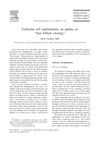My Delusional Hope - This page becomes irrelevant in 2030s Chat 11/3/2025
People are hopeful for a permanent hair loss solution by the 2030s, considering options like hair cloning and treatments like pp405. Synthetic hair transplants have been attempted but are not effective long-term.
View this post in the Community →
Similar Community Posts Join
5 / 1000+ resultscommunity Creatine is the opposite of minoxidil !
Creatine may counteract minoxidil's hair growth effects by closing potassium ATP channels, potentially leading to hair loss in predisposed individuals. Despite anecdotal reports, there is no conclusive evidence linking creatine to hair loss.
community PP405 vs Hair Cloning – Which Would Be Better for NW7 to NW1?
PP405 and hair cloning are discussed as potential treatments for reversing hair loss from Norwood 7 to Norwood 1. Hair cloning is seen as a more permanent solution, while PP405's effectiveness and long-term effects remain uncertain.
community Why the cure is not yet found and why it is always 5 years away? Why no hopes on PP405, GT, KX, Hair cloning, AMP, etc, etc, etc
Skepticism about hair loss research motivations, suggesting financial interests hinder finding a cure. Mentions treatments like minoxidil, finasteride, and dutasteride, but notes they are not cures.
community PP405 Might Be the Closest We Have to a Upcoming Cure
PP405 is considered a promising potential cure for hair loss, with phase 2 trial results expected in February 2025. Hair cloning is also discussed as a potential ultimate solution, despite significant scientific challenges.
community Update July 2025] Most Promising Hair Loss Treatments in Clinical Trials
Promising hair loss treatments in clinical trials include Pyrilutamide, GT20029, CB-03-01, and PP405, with potential market releases between 2027 and 2029. Hair cloning remains experimental and expensive, while existing treatments like finasteride, minoxidil, and microneedling continue to be used.
Related Research
6 / 1000+ resultsresearch Induced Pluripotent Stem Cells From Human Hair Follicle Keratinocytes As A Potential Source For In Vitro Hair Follicle Cloning
Human hair follicles can be used to create stem cells that might help clone hair for treating hair loss or helping burn patients.

research Follicular Cell Implantation: An Update on Hair Follicle Cloning
The document concludes that while "hair follicle cloning" shows promise for unlimited donor hair, it faces challenges with consistency and safety in humans.

research Cell-Based Treatments for Hair Loss: Research Update on Hair Cloning
Research on "hair cloning" for hair loss shows potential for hair thickening but has not yet achieved new hair growth in humans.

research The Evolution of the Promise of Hair Cloning: How Hair Cell Cloning Will Fit Into Your Practice
Hair cell cloning could potentially rejuvenate shrinking hair follicles, allowing for lifelong hair maintenance.
research Hair Cloning And Follicular Cell Implantation
Hair cloning could solve the problem of limited donor hair in transplants.

research Induced Pluripotent Stem Cells from Human Hair Follicle Keratinocytes as a Potential Source for In Vitro Hair Follicle Cloning
Human hair follicle cells can be turned into stem cells that may help clone hair for treating hair loss or burns.